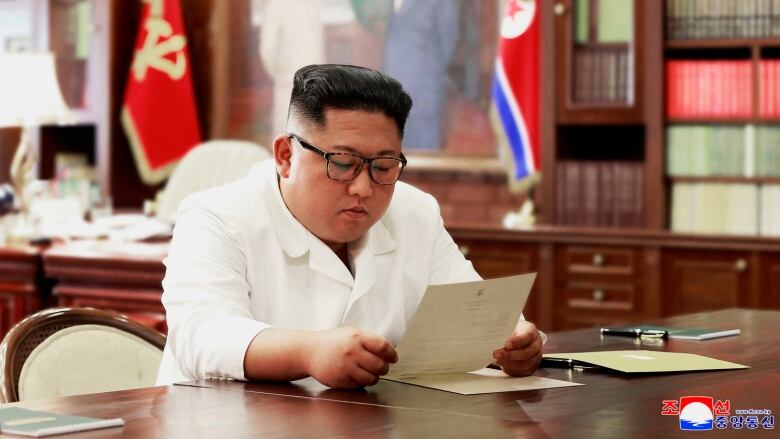U.S., North Korean officials holding talks to set up 3rd Trump-Kim summit, South Korea says
U.S. president, North Korean leader recently exchanged personal letters

North Korean and U.S. officials are holding "behind-the-scenes talks" to arrange a third summit between President Donald Trump and North Korean leader Kim Jong Un on the fate of the North's expanding nuclear arsenal, South Korea's president said, four months after a second meeting between the leaders in Hanoi collapsed without any agreement.
There have been no public meetings between Washington and Pyongyang since the breakdown of the Hanoi summit. But the prospects for a resumption of U.S.-North Korea diplomacy have brightened since Trump and Kim recently exchanged personal letters. Trump called Kim's letter "beautiful" while Kim described Trump's as "excellent," though the contents of their letters have not been disclosed.
In a response Tuesday to questions by The Associated Press and six other news agencies, South Korean President Moon Jae-in said that Trump's and Kim's "willingness to engage in dialogue has never faded" and that their recent letter exchanges prove that.
Moon, a liberal who met Kim three times last year, has made dialogue with the North as a route to forging peace on the Korean Peninsula a centrepiece of his presidency. He has played a central role in facilitating U.S.-North Korean negotiations, even if those efforts have at times been overshadowed by the Trump-Kim talks that he helped broker.
'Getting along very well,' Trump says
Moon said he doesn't see the Hanoi summit as a failure. He said he thinks the meeting served as a chance for both Washington and Pyongyang to better understand each other's positions and "put everything they want on the negotiating table."
"The success of denuclearization and the peace process on the Korean Peninsula cannot be determined by a summit or two," Moon said, adding that discussions in Hanoi will form the basis for future talks. "Both sides clearly understand the necessity for dialogue," he added.
Despite the deadlocked nuclear negotiations, both Trump and Kim have described their personal relationship as good. When asked whether Kim's recent letter included a mention about another summit, Trump said, "May be there was."
"But we, you know, at some point, we'll do that," Trump told reporters at the White House on Tuesday. "Getting along very well. He's not doing nuclear testing," he said.
North Korea reaching out to Russia, China
In yet another reminder of North Korea's continued mistrust of the United States, its foreign ministry said earlier Wednesday it won't surrender to U.S.-led sanctions and accused Washington of trying to "bring us to our knees."
Kim has said the North would seek a "new way" if the United States persists with sanctions and pressure. Following his setback in Hanoi, Kim travelled to Russia'sfar east in April for his first summit with Russian President Vladimir Putin. Kim also hosted Chinese President Xi Jinping in Pyongyang last week for their fifth summit since March last year, and experts say the North's outreach to its traditional allies is aimed at strengthening its leverage with the Trump administration.

Moon said he views the North's expanding diplomacy with Beijing and Moscow as a positive development in efforts to resolve the nuclear standoff.
"China and Russia have continued to play constructive roles so far to peacefully resolve the Korean Peninsula issue," he said. "I hope that China and Russia will play specific parts in helping the North resume dialogue at an early stage."
Not clear how close Kim-Trump summit is
Moon didn't elaborate whether U.S and North Korean officials had face-to-face meetings and if so where they took place. He also didn't clarify who were interlocutors or how close they were in setting up a third Kim-Trump summit.
Trump's top envoy on North Korea, Stephen Biegun, is to visit South Korea on Thursday, and some experts said he may use his trip as a chance to meet North Korean officials at a Korean border village. Secretary of State Mike Pompeo said Sunday the U.S. was prepared to resume talks with North Korea "at a moment's notice" if the North signalled it wanted discussions about denuclearization.
Despite a possible restart of negotiations, it's still unclear whether Washington and Pyongyang can eventually achieve agreements that can satisfy both sides. The Hanoi summit fell apart after Trump rejected Kim's calls for major sanctions relief in return for dismantling his main nuclear complex, something that U.S. officials see as a partial denuclearization step.
Kim has since fired missiles and other weapons into the sea and asked Trump to work out mutually acceptable agreements by the end of this December. U.S. officials maintain sanctions on North Korea would remain in place until North Korea takes significant steps toward nuclear disarmament.
North Korea has long bristled at the significant U.S. military presence in South Korea, and wants assurances it will not be targeted by the U.S. and South Korea. It sees its pursuit of nuclear weapons and ballistic missiles as an insurance policy against military action.












_(720p).jpg)


 OFFICIAL HD MUSIC VIDEO.jpg)
.jpg)



























































































